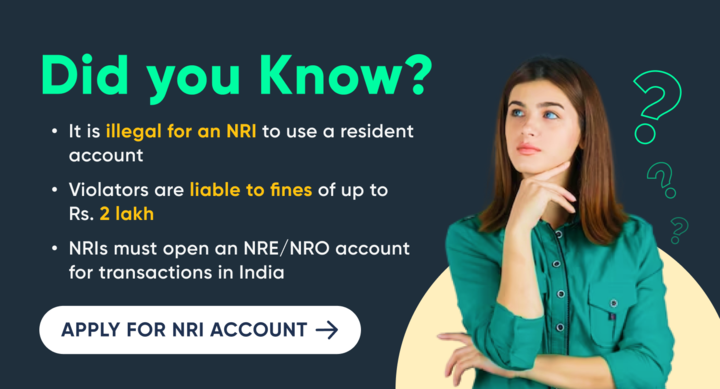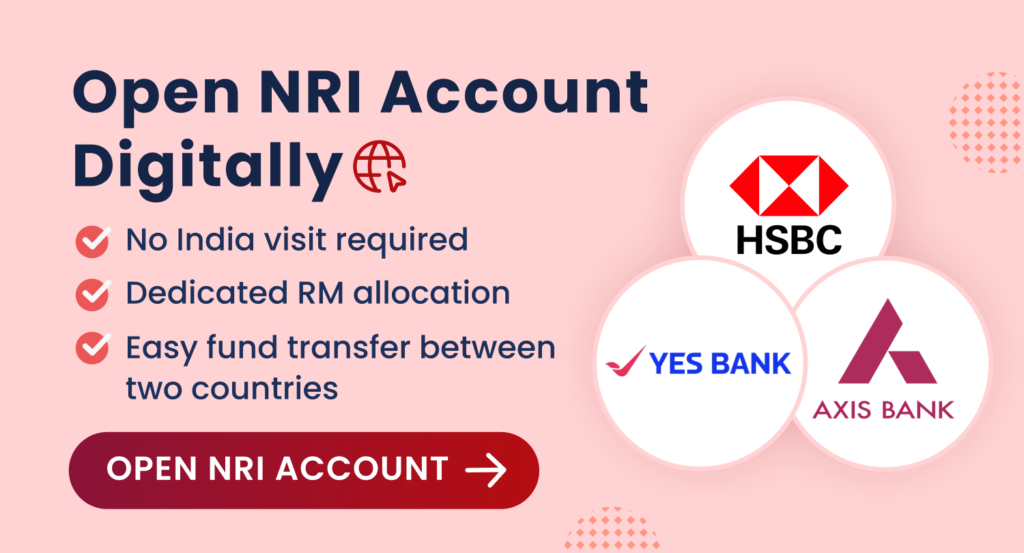
Non-Resident Indians (NRIs) and Overseas Citizens of India (OCIs) need a bank account in India to conduct various financial transactions, invest in Indian markets, and collect rental income and dividends. From knowing “how important it is for you as an NRI to open bank account to how to open a bank account as NRI” it’s a journey. Here, we have outlined five major points you should check to have a seamless banking experience. From regulatory requirements to managing benefits, find everything in these 5 things to note for NRI Bank account opening in this blog.
Why do NRIs need a Bank account?
NRIs/OCIs, just like anyone else, require a secure and reliable way to manage their finances. However, being away from their home country, they face challenges in handling their money and transactions in India. The purpose of this introduction is to clarify the need for NRIs to have a bank account in their home country. Having a bank account can give you the following advantages:
- Getting money from abroad
- Saving and Managing Money
- Investing in India
- Have Access to Financial Services
- Transaction Convenience

5 Things to Note for NRI Bank account opening
Planning to open a bank account in India as an NRI? Here are 5 things you should note for NRI Bank account opening before that:
- NRO/NRE Accounts: A Non-resident can open a Non-Residential External or NRE account to deposit and maintain his/her foreign earnings in India. This is a rupee-denominated account and can be opened in the form of savings or current bank accounts. Interest earned from these accounts is not taxable in India. On the other hand, An NRO or Non-Resident Ordinary account is primarily opened for depositing income earned in India, such as rental income, dividends, pensions, etc. You can convert a resident account into an NRO account once your resident status changes to NRI.
- Interest Rates: Different banks offer different rates on deposits. So, it’s crucial to compare and choose the one that offers competitive rates. Interest rates can also fluctuate based on market conditions, economic factors, and changes in government policies. Therefore, it’s crucial to keep an eye on interest rate movements and consider the impact on various NRI accounts.
- Ease of Banking: Look for banks that offer seamless online and mobile banking services. This will make it convenient for you to manage your account, transfer funds, and pay bills, no matter where you are in the world for finances will be safely managed. And you can keep updated with all the activities from your own devices.
- Global Reach: Having a bank account with global reach provides convenience for managing finances across borders, facilitating easy international transactions and currency diversification. It offers access to international banking services, enhances asset protection, and provides travel benefits. Additionally, it ensures easy access to a global network of branches and ATMs for banking services worldwide. Especially if you are someone who loves to travel. It’ll save you from hefty ATM withdrawal fees and make accessing your funds an ease.
- Regulatory Compliance: Make sure you provide all necessary documents to follow regulations. Follow guidelines outlined in the Foreign Exchange Management Act (FEMA) to avoid legal complications. Understand rules regarding fund repatriation and tax implications. Stay informed about any changes in regulations to maintain compliance. This ensures a hassle-free banking experience while living abroad.

What is an NRO Account?
An NRO or Non-Resident Ordinary account is primarily opened for depositing income earned in India, such as rental income, dividends, pensions, etc. You can convert a resident account into an NRO account once your resident status changes to NRI. For instance, Mr. Joginder, an NRI staying in London (UK), has an apartment in Delhi which he has rented out to Mr. Rahul. To receive rental income periodically from Rahul, Joginder has to open an NRO account. For depositing Indian earnings, there is no step of currency conversion involved. Although foreign earnings can also be deposited in this account.
What is an NRE Account?
The full form of NRE is Non-Resident External Account. It is an NRI bank account for NRIs to transfer their foreign currency funds to India. The fund is converted into Indian Rupee or INR when deposited. Thus you can deposit funds in any currency, say Euro, and withdraw it in Indian denomination. There are various types of NRE accounts – savings account, current account, recurring or fixed deposit account. Based on your requirement you can choose from these accounts.
How to open an NRO/NRE Account in India?

You can apply for an NRI account online by clicking the ‘Apply for NRI Account’ button in this blog or:
- Simply download the SBNRI App.
- Log in using your Gmail or Apple ID.
- Next, choose a bank from the options available and click on “Apply”.
- From here, SBNRI takes care of the entire process, including bank communication, documentation, account opening, and activation.
With SBNRI, opening an NRI account has never been easier. This one-stop platform for NRIs in India also assists with banking, investment, taxation, real estate, and more. Trust SBNRI to simplify your transition to India.
Contact SBNRI
Due to lots of information and documentation required to apply for NRI accounts, NRI account opening process is lengthy and cumbersome elsewhere. You can download SBNRI App to apply for an NRE account with nominal documentation in just 10 minutes.
You can also click on the button below to apply for an NRI account. Visit our blog and YouTube Channel for more details.
FAQs
What is the checklist for NRI account opening?
- For an NRI account, you need some specific documents like
- Identification Proof
- Overseas Address proof
- NRI status proof
- Other tax-related documents under KYC process
What are the rules for NRI bank accounts?
- Foreign Exchange Management Act (FEMA) rules do not allow NRIs to open a savings account. NRIs need to set up either an NRO or NRE Account as Specified by the Reserve Bank of India (RBI).
What are the basics of NRI banking?
- The basics of NRI Bank account opening are:
- Account types, NRE and NRO.
- Regulatory Compliance, providing necessary documentation, along with Foreign Exchange Management Act (FEMA) regulations, and reporting income and transactions as per tax laws.
- Interest rate
Which is the best bank for NRI account in India?
- It depends on your requirements. You can compare the features of NRI accounts offered by multiple banks to find the best. For example, if you want to open an account with a top bank you can compare the features of SBI NRI account, HSBC NRI account HDFC NRI account and ICICI NRI account. However in terms of interest rate and minimum balance, DBS Bank NRI Account, IDFC Bank NRI Accounts can be a smart choice.
Who is eligible for NRI accounts?
- While NRE and FCNR(B) accounts can be opened only by NRIs and PIOs, foreign nationals coming to India as a tourist or for employment are also eligible for an NRO account and can easily open NRO account with the required documents as mentioned above in the blog.
How to withdraw money from NRE account?
- Only foreign currency can be deposited in an NRE account and the account converts it into the Indian Rupee (INR). The NRI account holder can withdraw money from his NRE account in INR (Indian Rupee). The family members or whoever has access to the account in India can withdraw money.
Are NRE accounts taxable in India?
- No, an NRE account is tax-free in India – income tax, wealth tax and gift tax are not applicable.
Can I have 2 NRE accounts?
- Yes, NRIs can open as many NRE accounts as they want. There is no restriction to open and maintain multiple NRE savings accounts.



